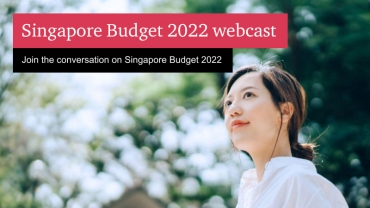
ESG ambitions grow, but key transition issues need to be addressed
07 March, 2022
This is a commentary written by Fang Eu-Lin, our Sustainability and Climate Change Leader and Irene Tai, our Energy, Utilities and Resources Tax leader, which was first published in The Business Times on 7 March 2022.
IT is commonly acknowledged that despite sustainability and climate change being an existential issue, its principles and foundations are fraught with imperfections.
From completeness, accuracy and comparability issues in carbon emissions and other environmental, social and governance (ESG) data, to the lack of solutions, these present a real challenge to companies that want to know where they stand and how they can transform.
This, in turn, makes it challenging for them to engage their stakeholders, such as investors and regulators, on this issue.
The recent 6th Assessment Reports from the Intergovernmental Panel on Climate Change (IPCC) Intergovernmental Panel on Climate Change (IPCC) paint a bleak picture of where we are headed, and while this is a gloomy forecast, it has motivated governments, businesses and communities to do more.
Hence, the proliferation of net-zero targets at both national and corporate levels in the past 2 years.
While ambitions are high, areas such as understanding and agreement over what is green, brown or transitional, what constitutes reductions or avoided emissions, what's considered "ambitious", or common frameworks for sustainability reporting and data management are all still very much work in progress.
The use of different methodologies leads to different ratings and, with the increasing number of rating agencies entering the market, it's like going on The Amazing Race using many different maps.
Nonetheless, there are talented people working together at break-neck speed to improve and streamline these principles and foundations.
Examples include the coming together of sustainability standards setters and frameworks in support of the International Sustainability Standards Board (ISSB), the coming together of experts to develop regional taxonomies, and the development of the Monetary Authority of Singapore's (MAS) Project Greenprint initiative.
Call for deliberate actions
The carbon tax increase announced in Budget 2022 sends a clear signal that behaviours need to change and that Singapore is serious about its climate change commitment.
The need for action to address climate change will intensify. Subsequently, climate targets will increase, policies will get more stringent and scrutiny will be heightened for businesses as the climate situation becomes more dire.
Physical risks of climate change will be felt for sure, the question is to what impact? Transitional risks will also be felt, but at what cost?
While standards, taxonomies and data quality in ESG are being worked on, the more initiated in the corporate community are keeping a close eye on these developments amid heightened ambition and scrutiny.
Climate-risk scenario analysis in physical and transitional risks can help with the resilience and strategy of organisations, and provide the much needed transparency in this area for the financial markets.
The Taskforce for Climate-related Financial Disclosure (TCFD) has garnered 3,000 supporting organisations across 93 jurisdictions - a testament to its credibility and usefulness.
This should prove even more useful to identify risks and opportunities as climate risks intensify.
PwC's 2021 State of Climate Tech study shows that there are opportunities in wind power, food-waste technology and green hydrogen production, which are currently underfunded, despite having a higher emissions-reduction potential.
Just transitions are also on the minds of leaders - how does one decarbonise their countries and organisations while minimising unintended damage like job losses?
A hopeful example is the Ruhr region in Germany, which has successfully managed the transition from coal mining to becoming a green industry hub.
This was due to deliberate and careful long-term planning, with key ingredients such as progressive transition, upskilling, strong stakeholder engagement, and federal support.
At present, the demands of sustainability far outweigh the pool of talent available. Without the ESG talent pillar, our ambitions might be well out of reach.
A "green skillsfuture" roadmap - whether at an industry level or company level - of new and adjacent jobs might be most useful to facilitate just transition, and encourage participation across different quarters of society.
In Singapore, upskilling and reskilling programmes are underway at trade associations and chambers, and institutes of higher learning, but will require the will and interest from the community to participate in this opportunity.
An interesting development is that governments, investors, rating agencies and other stakeholders are increasingly scrutinising tax information to assess businesses' commitment to society and overall ESG profile. Not taking an ESG-based approach to your tax reporting will likely result in missed opportunities and potentially reputational damage.
Meanwhile, overlooking the green tax incentives and subsidies available will result in missed opportunities in getting the necessary support to transition.
Plan for the long game
The above are some of the ESG themes in the near term which need to be thought through to set a strong foundation for a successful transition - from talent and skills, to managing risk and sowing the seeds to reap future opportunities.
What we do in the next few years will determine how we can meet our mid- and longer term sustainability and climate goals. We all have our work cut out for us, but conditions are ripe for deliberate and thoughtful action.
Get in touch with our authors
Irene Tai








